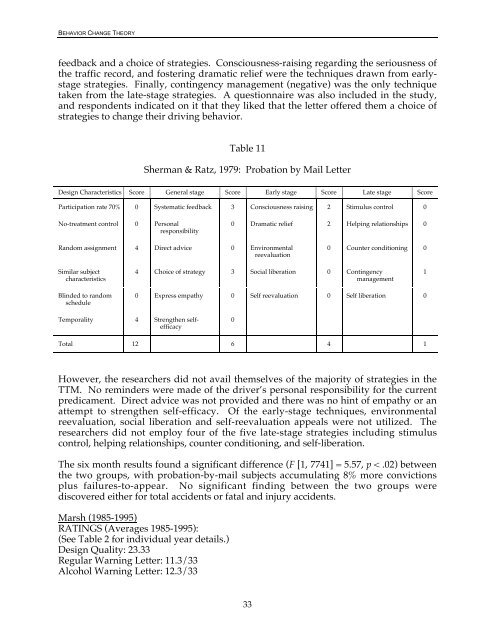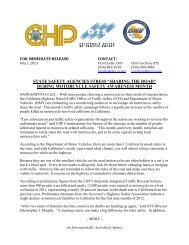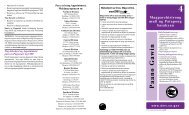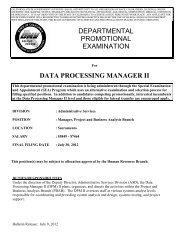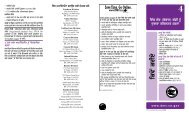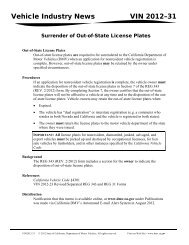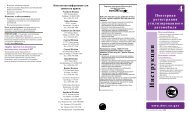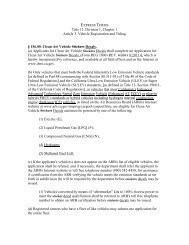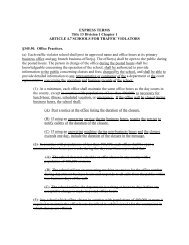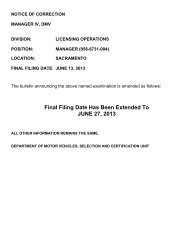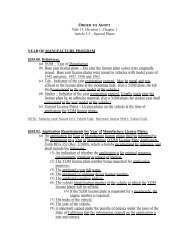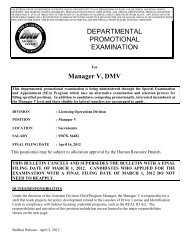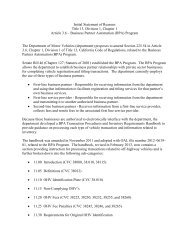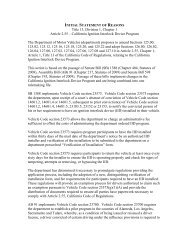Application of Behavior Change Theory to the Development
Application of Behavior Change Theory to the Development
Application of Behavior Change Theory to the Development
You also want an ePaper? Increase the reach of your titles
YUMPU automatically turns print PDFs into web optimized ePapers that Google loves.
BEHAVIOR CHANGE THEORY<br />
feedback and a choice <strong>of</strong> strategies. Consciousness-raising regarding <strong>the</strong> seriousness <strong>of</strong><br />
<strong>the</strong> traffic record, and fostering dramatic relief were <strong>the</strong> techniques drawn from earlystage<br />
strategies. Finally, contingency management (negative) was <strong>the</strong> only technique<br />
taken from <strong>the</strong> late-stage strategies. A questionnaire was also included in <strong>the</strong> study,<br />
and respondents indicated on it that <strong>the</strong>y liked that <strong>the</strong> letter <strong>of</strong>fered <strong>the</strong>m a choice <strong>of</strong><br />
strategies <strong>to</strong> change <strong>the</strong>ir driving behavior.<br />
Table 11<br />
Sherman & Ratz, 1979: Probation by Mail Letter<br />
Design Characteristics Score General stage Score Early stage Score Late stage Score<br />
Participation rate 70% 0 Systematic feedback 3 Consciousness raising 2 Stimulus control 0<br />
No-treatment control 0 Personal<br />
responsibility<br />
Random assignment 4 Direct advice 0 Environmental<br />
reevaluation<br />
Similar subject<br />
characteristics<br />
Blinded <strong>to</strong> random<br />
schedule<br />
Temporality 4 Streng<strong>the</strong>n selfefficacy<br />
0 Dramatic relief 2 Helping relationships 0<br />
33<br />
0 Counter conditioning 0<br />
4 Choice <strong>of</strong> strategy 3 Social liberation 0 Contingency<br />
management<br />
0 Express empathy 0 Self reevaluation 0 Self liberation 0<br />
0<br />
Total 12 6 4 1<br />
However, <strong>the</strong> researchers did not avail <strong>the</strong>mselves <strong>of</strong> <strong>the</strong> majority <strong>of</strong> strategies in <strong>the</strong><br />
TTM. No reminders were made <strong>of</strong> <strong>the</strong> driver’s personal responsibility for <strong>the</strong> current<br />
predicament. Direct advice was not provided and <strong>the</strong>re was no hint <strong>of</strong> empathy or an<br />
attempt <strong>to</strong> streng<strong>the</strong>n self-efficacy. Of <strong>the</strong> early-stage techniques, environmental<br />
reevaluation, social liberation and self-reevaluation appeals were not utilized. The<br />
researchers did not employ four <strong>of</strong> <strong>the</strong> five late-stage strategies including stimulus<br />
control, helping relationships, counter conditioning, and self-liberation.<br />
The six month results found a significant difference (F [1, 7741] = 5.57, p < .02) between<br />
<strong>the</strong> two groups, with probation-by-mail subjects accumulating 8% more convictions<br />
plus failures-<strong>to</strong>-appear. No significant finding between <strong>the</strong> two groups were<br />
discovered ei<strong>the</strong>r for <strong>to</strong>tal accidents or fatal and injury accidents.<br />
Marsh (1985-1995)<br />
RATINGS (Averages 1985-1995):<br />
(See Table 2 for individual year details.)<br />
Design Quality: 23.33<br />
Regular Warning Letter: 11.3/33<br />
Alcohol Warning Letter: 12.3/33<br />
1


